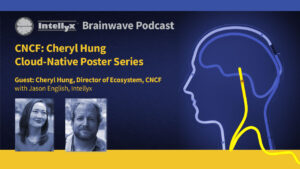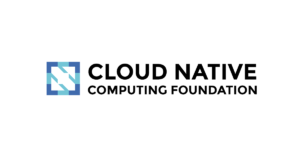Intellyx Brainwave Podcast / vCast July 24, 2020:
 Join JE with Cheryl Hung, VP of Ecosystem for the Cloud-Native Computing Foundation (or CNCF), and a proud Industry sponsor of the new, steampunk-themed Intellyx Cloud-Native Computing poster — helping you sort out the massive interconnected complexity of cloud-native architecture, integration and applications. This non-vendor, non-tool specific diagram may show you just the bits you missed in your cloud migration and IT modernization strategy. Download your own copy today at: https://intellyx.com/cncposter.
Join JE with Cheryl Hung, VP of Ecosystem for the Cloud-Native Computing Foundation (or CNCF), and a proud Industry sponsor of the new, steampunk-themed Intellyx Cloud-Native Computing poster — helping you sort out the massive interconnected complexity of cloud-native architecture, integration and applications. This non-vendor, non-tool specific diagram may show you just the bits you missed in your cloud migration and IT modernization strategy. Download your own copy today at: https://intellyx.com/cncposter.- Listen to the podcast on your favorite player here: https://anchor.fm/intellyx/episodes/Brainwave-Podcast-Cheryl-Hung–CNCF—Intellyx-Cloud-Native-Poster-Series-eh3e1s/a-a2oq6kb
- Watch the video version on YouTube here: https://youtu.be/MJ41NcaXuGY
About Cheryl Hung:
 Cheryl Hung is Director of Ecosystem at the Cloud Native Computing Foundation, home of Kubernetes and part of the Linux Foundation. Her mission is to drive engagement and growth of open source infrastructure and communities, including the 5500+ person meetup she founded, Cloud Native London.
Cheryl Hung is Director of Ecosystem at the Cloud Native Computing Foundation, home of Kubernetes and part of the Linux Foundation. Her mission is to drive engagement and growth of open source infrastructure and communities, including the 5500+ person meetup she founded, Cloud Native London.
In addition, Cheryl also keynotes at conferences and advises startups on developer-led growth and open source strategy. She started as a software engineer writing C++ on Google Maps, before moving into engineering management and developer advocacy. Cheryl holds a Masters in Computer Science from the University of Cambridge, King’s College.
About the CNCF
Cloud native computing empowers organizations to build and run scalable applications with an open source software stack in public, private, and hybrid clouds. The Cloud Native Computing Foundation (CNCF) hosts critical components of the global technology infrastructure, including Kubernetes, Prometheus, and Envoy. CNCF brings together the industry’s top developers, end users, and vendors, and runs the largest open source developer conferences in the world. Supported by more than 500 members, including the world’s largest cloud computing and software companies, as well as over 200 innovative startups, CNCF is part of the nonprofit Linux Foundation. For more information, please visit www.cncf.io.
Show links:
- The State of Cloud Native Report – get it: https://www.cncf.io/blog/2020/05/04/the-state-of-cloud-native-development-a-new-survey-report/
- Kubernetes and Istio success story at the USAF https://youtu.be/YjZ4AZ7hRM0
- Virtual CNCF KubeCon / CloudNativeCon coming up in August: https://events.linuxfoundation.org/kubecon-cloudnativecon-europe
- Get your own copy of the PDF of this poster now: https://intellyx.com/cncposter
- Listen/download the Podcast on your favorite channel or player here: Intellyx channel on Anchor.fm
- Watch the YouTube version here (video interview): https://youtu.be/MJ41NcaXuGY
Transcript of the podcast:
Jason English: Welcome to the Intellyx podcast and show. We’re doing a series of thought leaders and people who are involved in the cloud native community, as we introduce our cloud native computing poster. Our media sponsor for that of course, is the CNCF, which is kind of a fulcrum around which a lot of this community revolves.
Joining me today is Cheryl Hung. She’s the VP of ecosystem for the CNCF. So welcome to the show, Cheryl.
Cheryl Hung: Thanks, Jason. It’s awesome to be here.
Jason English: Yeah. I think most of our audience is probably familiar if they downloaded the poster, but they may not have had any engagement with the CNCF.
So what does the organization do?
Cheryl Hung: Fundamentally it’s an open source nonprofit. It’s underneath the Linux foundation, which obviously hosts Linux. And then we have a bunch of sister foundations around blockchain, networking, lots of other open source infrastructure pieces. So CNCF obviously is most famous for hosting Kubernetes, but also hosts about 40 open source projects in total.
So the goal of CNCF is to really sustain and grow the communities around these projects to make sure that when we’re using and relying on cloud native, we have all the good bits about open source or the eyes on it, and picking out the bugs and just making it useful for everybody.
Jason English: Yeah. how do your efforts help promote this cloud native landscape of both practitioners, then a lot of the other companies that are involved?
Cheryl Hung: We have quite a few different things. In fact, you could argue that awareness and promotion of the open source projects is one of the core functions of the CNCF.
So we do a lot of events. At least we would normally, obviously we’re not staying any in events at this time. But we go and spread the word about it. We produce case studies about different companies that are adopting cloud native and the journey that they’ve taken. The cloud native landscape, as you mentioned just a minute ago, actually, the, the cloud native landscape, the one with all the logos on it, that’s another initiative from the CNCF to show off all the products and companies that are involved in this space.
Jason English: I know the rate of development has probably accelerated exponentially right over the last few years, especially. What challenges do you think companies have as they’re approaching using, a set of open source technologies and moving on this cloud native journey that you see so far?
Cheryl Hung: So as director of ecosystem, I primarily work with end users. So these are companies that are adopting cloud native. And in a sense, you could say that I’m an end user of sorts myself, because I started out as an engineer at Google writing code and deploying it using Borg, and Borg later inspired Kubernetes.
So I’m very, very interested and passionate about how companies are adopting cloud native. And by some of the challenges that I see today. So I got into this space in 2016, 2017. And I would say compared to that time, a lot of the fundamentals are now pretty solid. So how do you deploy and configure Kubernetes?
How do you monitor it? How do you auto-scale it? These are well-understood problems now. I think the challenge has moved to things like, should you be using a service mesh to control your networking? What’s the security story? And also, just the general complexity and the understanding around the solution.
Like how do you bring the SRE mindset or the DevOps mindset to the development teams?
Jason English: It seems like there are a lot of newer projects tending to focus on security, governance, a lot of the kind of higher order aspects rather than just the development and deployment of the software itself. Right?
Cheryl Hung: Totally. I mean outside of deploying it and configuring it. It’s actually fairly straightforward now. It’s all of the Day 2 operations that we’re still finding hard. And in fact, CNCF has a great case study just released a couple of weeks ago for the US Air Force. So the USAF are really trying to bring the DevSecOps model and they’ve deployed Kubernetes and Istio onto fighter jets without changing any of the legacy hardware.
So going from running ADA to running, you know — Go, Kubernetes, Istio, like a full modern cloud-native stack, and they achieved that in 45 days. So it’s a really fun one to watch. You can check out the study, if you search for the CNCF YouTube channel and the US Air Force.
Jason English: I’ll definitely look for that.
And I’ll put that link in the show notes here. that’s interesting. It seems like we’re seeing a trend where a lot of people talk about Cloud-Native and they just automatically associate it with Kubernetes, but really it’s more of an overall mindset about just running workloads, wherever they really make the most sense. Right. So it’s kind of that portability and, that sort of capability seems to define it. how would you see that definition emerging these days?
Cheryl Hung: It’s definitely changed because originally it was just containers, orchestration, microservices.
Right. You know, you’d do that, and you were done, and that’s changed over time because of things like serverless coming up, which is quite a different paradigm, but yeah, an interesting stat is that in 2019, we ran a survey. We ask people, why do you actually deploy cloud native? What are the benefits that you’re getting out of it?
And the number one reason that people use cloud native is because they want to deploy faster, more frequently. So being able to not deploy on a quarterly or monthly cadence, but on a daily or weekly or multiple times a day. And I think cloud native is more about that automation and smoothing that pipeline out than it is about, you know, do you use Kubernetes or not?
Jason English: Yeah. I’m sure that a big part of your mandate is really to increase the level of education of the overall community. It seems like the number one complaint that I see, especially among the larger corporations, is that they don’t have enough talent to support these environments and what could be done to kind of help move that effort along, you think?
Cheryl Hung: Well, this is why it’s great to be on podcasts like this, right? This is the community. This is us sharing what we know with people who maybe have heard about it, but then they’re not sure where to look. So things like this, this kind of peer-to-peer sharing fuels a lot of open source and fuels Cloud-Native, really.
In terms of the big company, I would recommend that you could also look at the certified Kubernetes administrator program, if you were looking for more formal training curriculum. So the content for that is all open source. It is a certification that you can pay for to get a name. But if you just look at the content, it actually provides a really good overview of all the important principles and fundamentals around operating cloud native stacks.
But also, as I said, you should be in the community. You will learn more by going to meetups and listening to podcasts and watching YouTube videos and attending some of the online courses than you will from sitting and reading a book.
Jason English: Yeah. Agreed. you know, I don’t know when there’ll be a next KubeCon, but that seems to be where we see a lot of activity swirling around there.
So until then, you know, we’re, we’re online line and we all have to learn and network.
Cheryl Hung: Yeah. Kubecon is great. Like. I said when, when it comes back, I will definitely be there. So I hope to see some of you there as well. In fact, we have opened the registration for the virtual KubeCon/CloudNativeCon, the one that is replacing Amsterdam this year.
So, you know, it’s not the same, but at least we try and sort of stay together as a community. And in fact, I think compared to many places, open source is actually in a really good position to weather all these changes because we’re all used to working remotely and connecting remotely anyway.
Jason English: Yeah. And it can be more driven by, you know, basically the results you’re producing (as a group) and not the bottom line, like other companies that are driven by shareholder value. It’s like – we all have to get work done.
Cheryl Hung: I have nothing against companies that like making money or anything like that.
Vendors are as much a part of the community is as anybody else, but it is nice to have one place where, you know, you know, everything’s going to be open source. There’s just going to be, you know, architects and peers and technical people talking amongst themselves. So it’s great fun.
Jason English: I guess last question Cheryl would be, what do you see as the trend to watch over the next one or two years in this space?
Cheryl Hung: So, before I joined the CNCF, I was a DevOps manager at a cloud native storage company, StorageOS. And I thought when I joined that running persistent storage would be a solved problem within a couple of years.
And I think it’s still a very, very hard one — databases within a cloud-native stack. And I think there were changes that are coming up, allowing this understanding how to run stateful applications and persistent storage.
But for me personally, that’s one area that I have a lot of fondness for. And one I’m excited to keep track of in the next few years.
Jason English: Yeah. I guess we’ll see a lot of evolution there, it is definitely an area to watch, how to solve data storage in a stateless environment and where that’s going to go in the near future.
Cheryl Hung: It’s definitely a hard problem, but one that everybody needs solved. So I think that’s why I find it so exciting.
Jason English: Well thanks Cheryl. Is there a place to go look you up other than, I guess they could go to the CNCF.io site, but any other resources you’d recommend, as a starting point?
Cheryl Hung: I would say, come to KubeCon first of all, come to the virtual KubeCon
Jason English: anything else? Interesting you wanted to share, Cheryl?
Cheryl Hung: Yeah. So we’ve got the 2020 version of the CNCF survey coming out around now. So please go and check it out. We’ll have a lot of information from a lot of different developers. And it will be all information about the benefits that they’re getting from cloud native.
What are the challenges they see? What are the tools that they’re using? It’s really, really good information. We put an anonymized version out on GiHub as well. So if you wanted to go and actually check it out and run your own analysis, you can do that. So I would say, please check out the 2020 survey.
Jason English: Excellent. I’ll put that link in there too, so we can get some involvement. All right. Well, I appreciate your time, Cheryl, and thanks for joining me.
Cheryl Hung: Thank you, Jason. It’s been really fun.
Jason English: Yeah. And that concludes our program.
Announcer: Thank you for listening to the Intellyx podcast. If you have any questions or ideas for future episodes, feel free to drop us an email at PR@Intellyx.com. Until next time, keep on transforming.
©2020 Intellyx LLC. All dialogue in this program represents the expressed opinions of the hosts and guests, and are not necessarily the official position of Intellyx, or any company mentioned or included in this podcast audio or video. Intellyx publishes the Cloud-Native Computing Poster, and the biweekly Cortex and BrainCandy newsletters.



